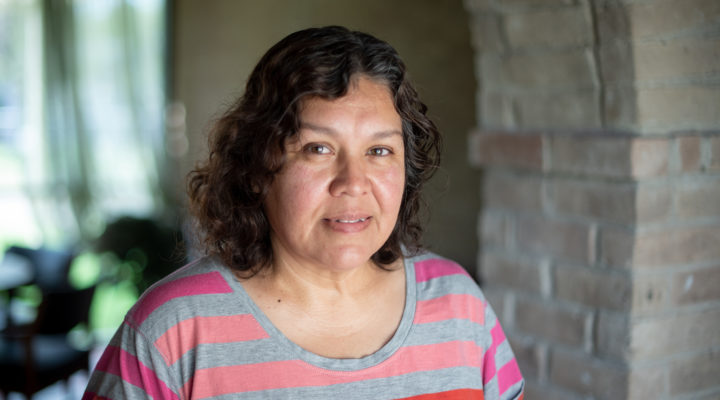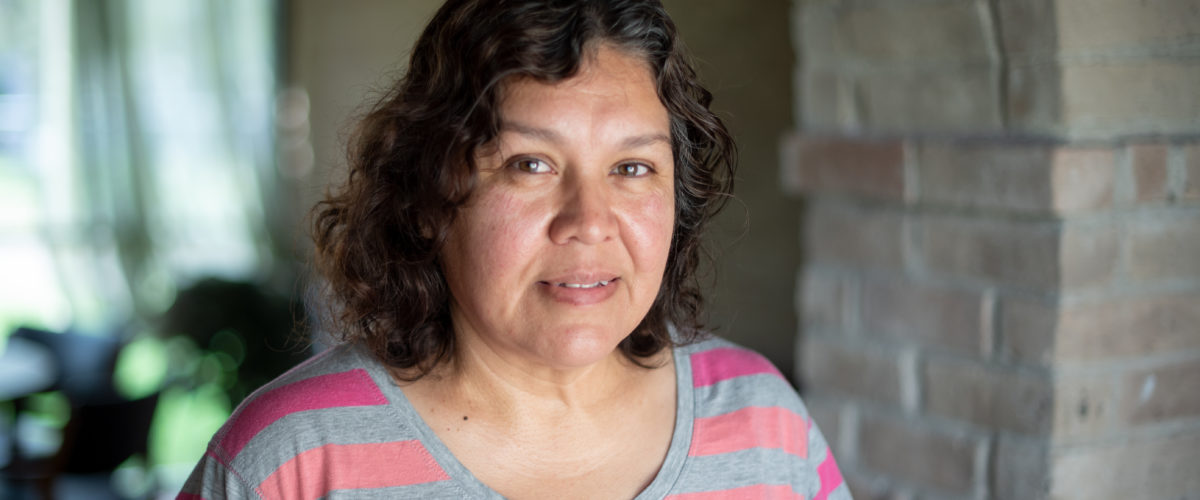“I didn’t want to come here. Leaving everything that I knew — my life, my friends. I’m so thankful now, but I was very upset with the United States for a while.”
Aracely Salazar sits tranquilly in the sunlit atrium of the Rio Grande Valley Baptist Association headquarters. The reception desk will survive without her, at least for half an hour. Besides, it’s Friday and she is eager to tell a harrowing story. Behind her, the south window opens to a quaint street of pastel casitas, peppered with palm trees, Aughts-era minivans and Esperanza shrubs touting their golden-yellow trumpets in the September sun. Her delicate voice barely clears the hum of Interstate 2, as eastbound hordes whiz past Weslaco toward Brownsville and South Padre.
Salazar has found indelible peace in her role as ministry assistant for the RGVBA and nearby Iglesia Bautista Calvario de Weslaco. But the road here was anything but serene. It began 45 years ago just across the border on the outskirts of Matamoros, Tamaulipas in Mexico, where she grew up. Life was somehow simpler then, despite that Salazar’s father — the family’s only full-time wage earner — took home about 80 pesos a week as a truck driver. That’s very little, she says, especially with a wife and five kids.
Salazar did her part as well. When her uncles and grandmother would bring vegetables from Texas, six-year-old Salazar would sell them to local neighbors to supplement her family’s income. Somehow she understood their struggle, even then, but “poverty” was never her reality.
If you wanted to eat meat, that was once a month. I don’t know how we survived. It was difficult, but it didn’t affect us much. It was just a way of life for us.
“We didn’t have much, but somehow we didn’t realize it because everybody in the neighborhood was the same,” she says. “We all lived day to day. We all had the same used clothes. You wouldn’t go to town unless you had to go to school or buy shoes, and that was only once a year. If you wanted to eat meat, that was once a month. I don’t know how we survived. It was difficult, but it didn’t affect us much. It was just a way of life for us.”
Even her parents’ inability to afford shoes for her and her siblings was lost on her. “My dad would get upset because he was not able to buy us shoes to wear every day, but I just loved to be without them,” she explains with a smile. After all, she adds, while everyone else played stickball, she would climb to the top of the colossal tree in the center of her family’s plot, where she could see the city. In the evenings, friends from across the street would join the family and chatter on the patio until bedtime.
“It was like a big family for us,” Salazar says. “There was a lot of love, and we were always together. I think that’s what helped us make it through.”
But everything changed the day her youngest brother was born with special needs. Doctors in Mexico simply couldn’t accommodate his disability, so the family applied for citizenship in the United States in order to access more advanced medical resources and care. In May 1981, Salazar’s all-guitar estudiantinas band was set to make its debut on Mother’s Day. But one week before the big moment she sold her guitar and moved to West Texas with her family. None of them spoke English. None of them had jobs waiting. Plus, she says, Americans stayed inside all day, and she was left to explore the outdoors on her own.
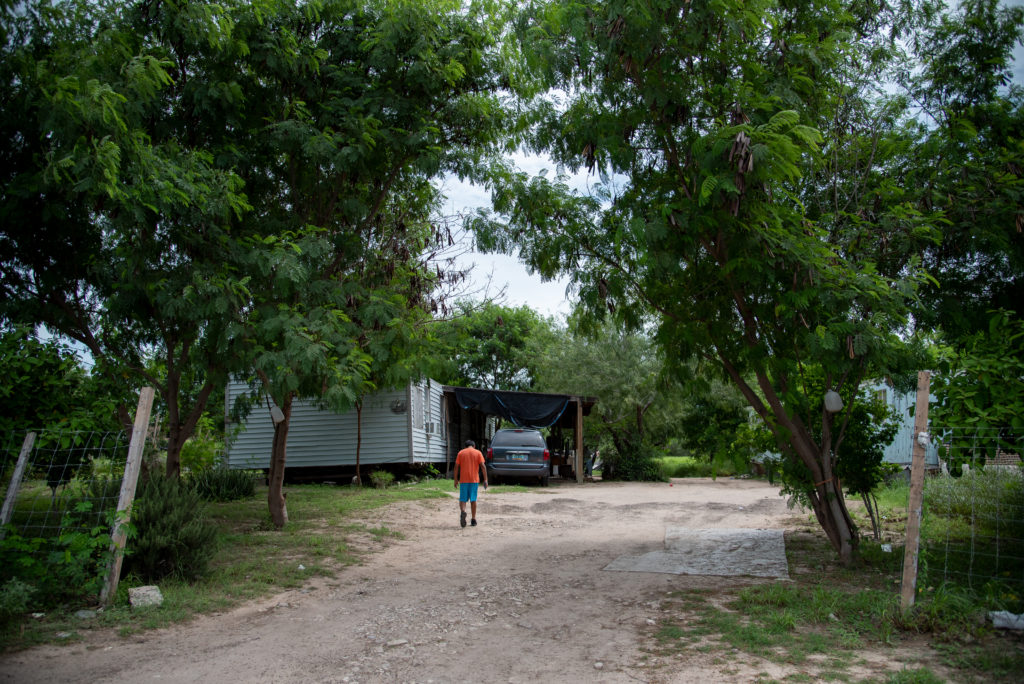
A young boy gets off the school bus and returns home after attending Saturday classes.
Salazar, age 12, started school, along with her siblings, only to discover loneliness and ridicule. Their American classmates pelted them with harassment and pet names, all because they couldn’t speak English. Meanwhile, the cost of living in the U.S. forced the entire family to take next-to-no-paying jobs in the fields picking fruit. From early May through the end of October, Salazar would work from 10 to 18 hours a day, trying desperately to fit a year of school into three or four months. Moreover, what little English Salazar picked up at school became her parents’ only lifeline for communication. Eventually, it all became too much. After the first semester of ninth grade, she dropped out of school.
“That’s a big responsibility for a child,” she says. “Leaving everything that I knew — my life, my friends. I was so much into Mexican culture, music, all of that stuff. I just loved it. It was a completely different way of life here, and I was just a little girl. When I came to school and didn’t understand anything, and realized that people wouldn’t like you just because you couldn’t speak their language, it was just very difficult. I was very upset.”
More dismaying than the hard labor and ridicule was a sudden, acute awareness of her family’s poverty, as if the United States had flipped a switch on her perspective of wealth.
Ironically, with school off of her plate, Salazar dedicated what little free time she had to learn English, her only hope for survival in the United States. That, and working dizzying hours in the fields. Still, she says, it was at least a chance to be outside and to spend her days singing with her father while they worked. In the back of her mind, however, she knew she was enduring the impossible. More dismaying than the hard labor and ridicule, she says, was a sudden, acute awareness of her family’s poverty, as if the United States had flipped a switch on her perspective of wealth.
“Somehow we understood a little bit of what was going on as kids but not fully, until we were living here in Texas and saw different things,” Salazar explains. “It was like, ‘Wow.’”
“When we came here, my brother got married, and my brother’s wife would celebrate so many things because she lived here. We started celebrating Christmas, Thanksgiving. We started to learn about this feast that we never had. We saw the difference, and we realized that we were poor.”
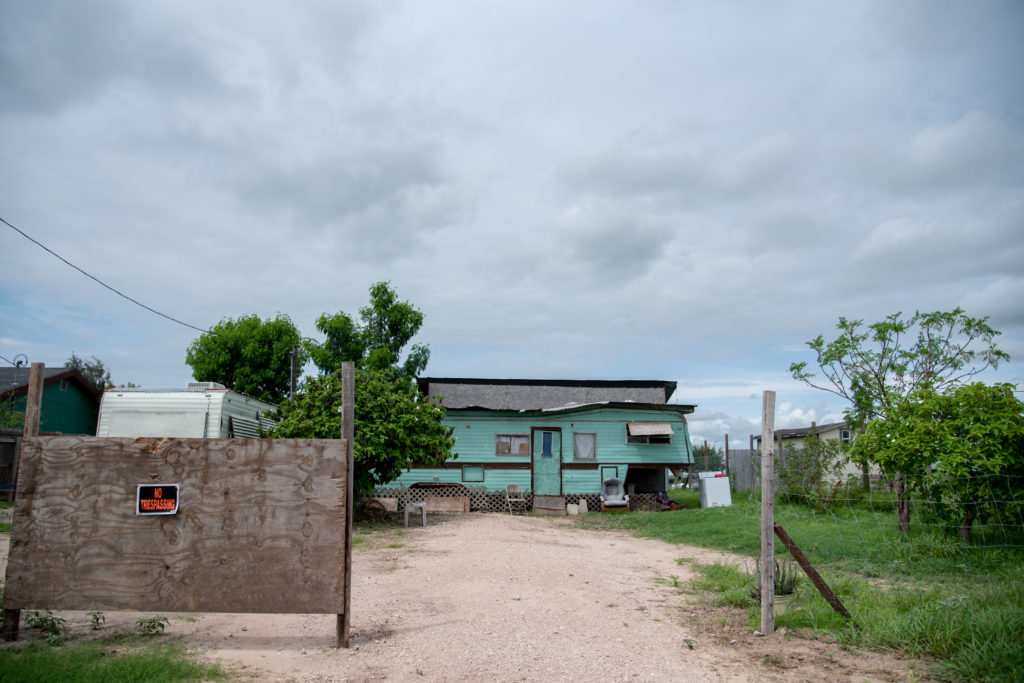
According to the Pew Research Center, 77% of Hispanics living in the United States believe that hard work will pay off and that each successive generation will be better off than the one before, compared to 62% of native-born Americans.
Eventually, Salazar abandoned her back-breaking job in the fields for vocational school, but like the endless baskets of picked produce, her roots had been irrevocably ripped from their life-giving soil. Still, she never stopped working. Armed with a new degree in secretary work, Salazar proceeded to Wal-mart, to K-mart, to her first marriage, to two children, to a divorce, to single motherhood and finally to Donna, Texas, just east of McAllen, where she worked for 18 years as a teacher’s aide, elementary school assistant and administrative secretary. Salazar remarried and had a third son, but her husband soon turned abusive, she says, and she filed for a second divorce. Three kids and lingering trauma was a weight she could no longer bear alone, she explains, so Salazar resigned her position with the school district and took a job with her brother’s cleaning company. It was time to start over, again. But this time, she says, she would begin with a literal leap of faith — back into a conviction and church community that would support her as she healed and rebuilt her life.
One day, as she was listening at work to KRIO Radio Esperanza, her moment came. “After my second divorce, I had started looking for churches again. I found Radio Esperanza, and they kept saying, ‘If you want to meet Jesus, come to Rio Grande Bible Institute.’ I kept hearing that and I told myself, ‘I want to go meet Jesus.’”
When Salazar contacted RGBI to inquire about a new career in ministry, she was instructed to submit a pastor’s letter of recommendation. She didn’t have a church home, let alone a pastor to speak on her behalf. So RGBI gave her a recommendation: Iglesia Bautista Calvario de Weslaco. “Honestly, I was thinking three weeks, and they’ll give me the letter,” Salazar says with a chuckle. “I arrived and asked the pastor for the letter, and he said, ‘Sure, we’ll give you the letter, but just get to know us.’”
God gives you a lot of good things, even though we come from a family that is very poor, with a lot of difficulties. It was a hard ride. What we have now is not so much about the jobs, but the peace.
Salazar’s “three weeks” turned into five years and counting, first working with IBCW’s youth ministry and now employed part-time as a ministry assistant. She continues to pursue her commissioning as a missionary through RGBI, but she isn’t waiting on a diploma to share her story of transformation.
“God showed me that I needed to go and find him,” Salazar says, holding back tears. “My family changed. I got baptized, and then my son, my sister and my younger brothers. My dad even gave his life to Christ a year before he died. Through that year, even though he never stepped foot in the church, he would tell everybody to stop suffering and find Jesus.”
“God gives you a lot of good things, even though we come from a family that is very poor, with a lot of difficulties. It was a hard ride. What we have now is not so much about the jobs, but the peace. God is so great, and he’s given us so much, and I see it in my family. Before, we would go to work and do whatever, but now we can do anything with God. God is great.”
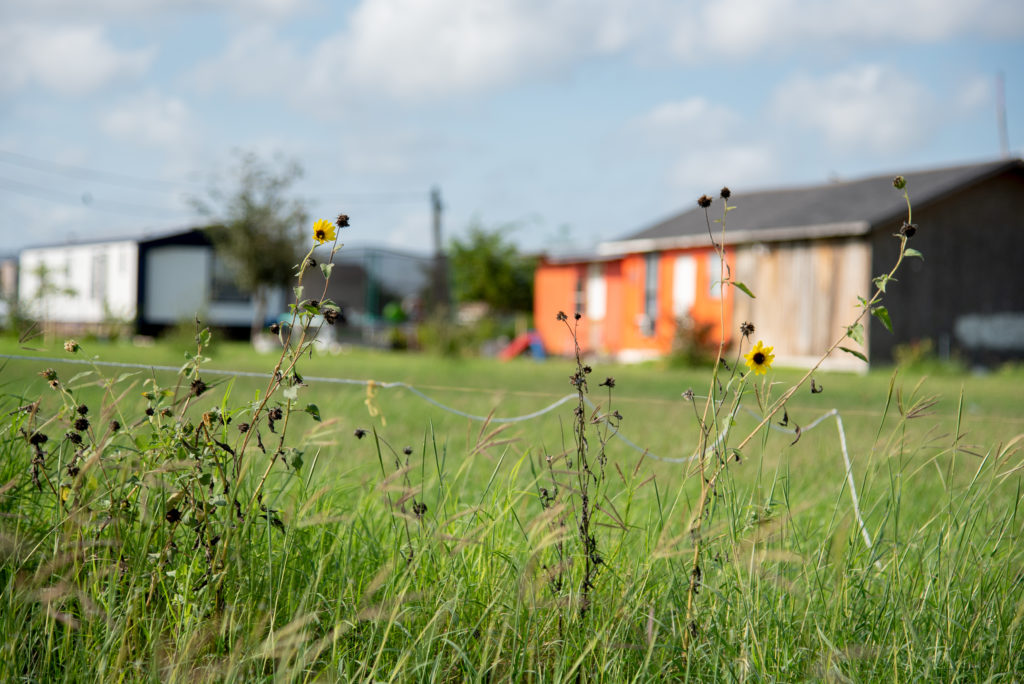
Even though a family may pay on a lease for years, the land owner may evict them for one single default of payment.
Though Salazar’s journey is far from complete, it is ultimately emblematic of the more than 11 million Mexican-born immigrants living in the United States. Arriving in the U.S., even legally, is simply no guarantee for prosperity or even a marginal rise from poverty, despite that 70 percent of Mexican immigrants 16 and over participate in the civilian labor force with one-fifth of the educational attainment of native-born and other foreign-born populations. Furthermore, Hispanics living in the U.S. are significantly more likely to believe in the American dream than even native-born residents. According to the Pew Research Center, 77 percent have faith that hard work will pay off and that each successive generation will be better off than the one before, compared to 62 percent of native-born Americans.
Yet, Mexican immigrants like Salazar continue to shoulder a greater share of poverty than native-born and other foreign-born populations living in the U.S., with a median household income of more than 30 percent less than the national average. There’s a misconception that immigrants come here to draw benefits from the United States, says Salazar, but that is simply not reality. She recalls the fields where she began her bewildering journey, where she met children as young as five working 18-hour days for below-poverty-level wages. These people are here to love this country, she says, not be a burden.
“These are good people. They just need an opportunity for a better life,” Salazar explains.
Arriving in the U.S., even legally, is simply no guarantee for prosperity or even a marginal rise from poverty.
“I worked many years in the fields and met a lot of people like us. And they weren’t looking to take anything away from the United States. They want to give if they can get the opportunity. I think that the United States should be able to see that because a lot of the work in this country is done by people like that. They need that help. People are good, if you allow them to be.”
In 2019, Salazar will celebrate her 15th wedding anniversary with her husband, Juan Angel, who was persistent and patient through her hesitancy to ever marry again, she says. Her three sons, Carlos, Rolando, and Christian, are now proud fathers to three little girls, all of whom she now spoils with gifts and trips to McDonald’s — a luxury she never enjoyed as a single mother.
Today, at the end of another workweek at Rio Grande Valley Baptist Association, gratitude far outweighs any regrets, she explains. Like so many of the families with whom she shared a field, a song, a smile, she is here to love this country, to work hard, to help her family thrive and to find peace.
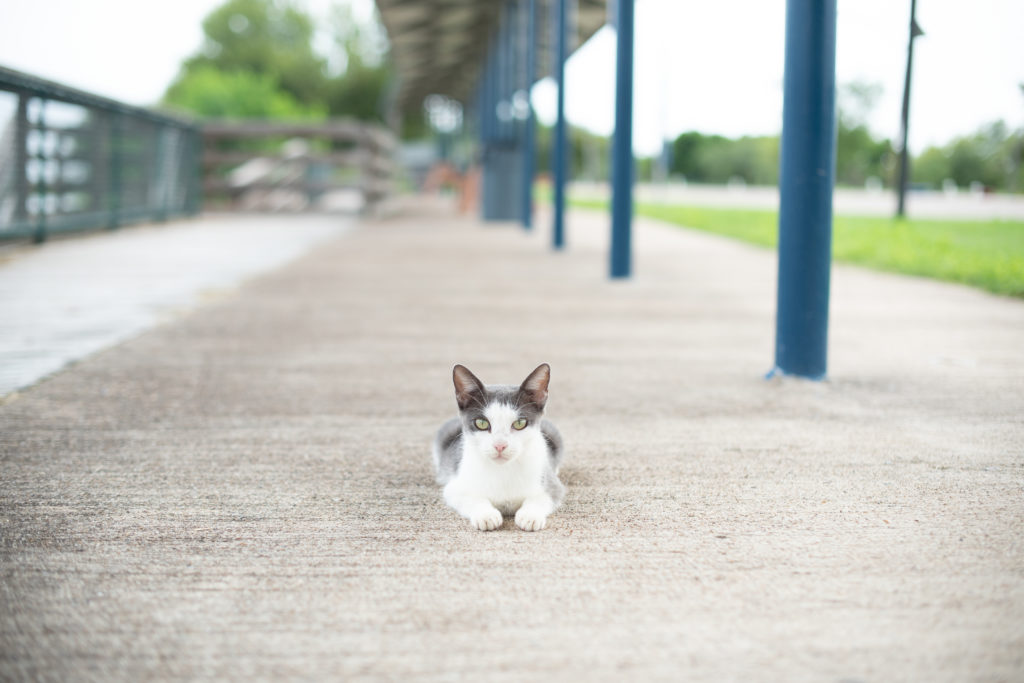
As fear of deportation increases along the U.S.-Mexico border, riverside recreation areas such as the Bentsen-Rio Grande Valley State Park are deserted by all but stray animals and the U.S. Border Patrol.
Read more in the Hidalgo County, TX series:
Along the Texas-Mexico border, overcoming poverty requires spiritual liberation
A Mexican immigrant’s harrowing rise from poverty in Hidalgo County, Texas
Hidalgo County, Texas: A Mighty Current
Photo Gallery: Hidalgo County Texas
Video: Diann Berry on Education
Video: Diann on Literacy Center Success Story
Audio: Eloy Mendiola (coming soon)
Related commentary at baptistnews.com:
On immigration, Franklin Graham is dead wrong | Mark Wingfield
The day life changed for a legal immigrant — and his church | Lauren Efird
Related news at baptistnews.com:
Engaging the immigration debate: Ethicist, pastor differ on New Sanctuary Movement
Border wall, immigration among top concerns for Hispanic Baptists, leader says
Despite the Rio Grande’s unmistakable capacity to both give and strip away life, there is yet a more formidable power in Hidalgo County, Texas, and it flows from within. It is a mighty current of resilience, propelling you toward more than fields and dollars, toward another semester of English classes, toward finally earning your GED, toward the purpose and passion that God has placed inside of you, toward a new opportunity to grow, to thrive and to find home once again.
This series in the “Resilient Rural America” project is part of the BNG Storytelling Projects Initiative. Has the United States forgotten its countryside? What strength and resilience may yet be stirring outside our city limits? In “Resilient Rural America,” we attempt to answer these questions when we visit these unique communities to examine the singular nature of poverty in rural America and tell the stories of development among its courageous and resilient people.
_____________
Seed money to launch our Storytelling Projects initiative and our initial series of projects has been provided through generous grants from the Christ Is Our Salvation Foundation and the Eula Mae and John Baugh Foundation. For information about underwriting opportunities for Storytelling Projects, contact David Wilkinson, BNG’s executive director and publisher, at [email protected] or 336.865.2688.

